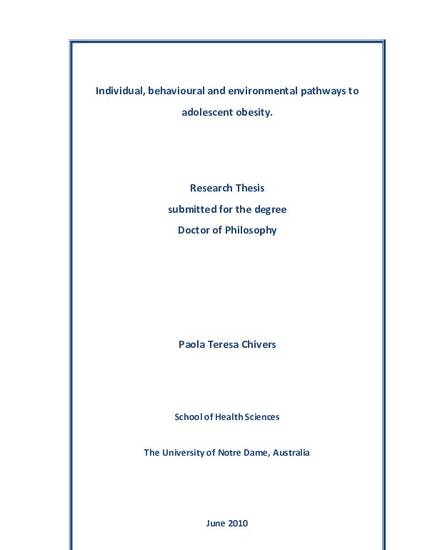
The longitudinal investigations of the contributions of obesogenic variables to developmental pathways of adolescent obesity were examined. Key obesogenic variables were examined from the extensive database of the Western Australian Pregnancy Cohort (Raine) Study. The data set included variables collected in utero (18-20 weeks), at birth, and at ages 1, 2, 3, 6, 8, 10, and 14 years.
The key research question was: How do individual, behavioural and environmental factors in childhood contribute to weight status at early adolescence? Investigation of this key question examined how factors change over time and their respective influence on obesity, identified critical points in the timing of change, and gender differences.
The conceptual model was framed from an individual, behavioural and environmental perspective, based on Bandura’s Social Cognitive Theory. Cross-sectional statistics described the sample and variables of interest. A longitudinal model of BMI from birth to 14 years using linear mixed modelling examined the influence of obesogenic variables on BMI over time and differences across weight status groups. Interrelationships between key variables and BMI at each follow-up and over time were investigated using exploratory structural equation modelling. Some key findings were that adolescents who were overweight or obese at 14 years followed different BMI trajectories from birth, compared to those of normal weight. There was a difference between weight status groups in the timing of adiposity rebound (p
This study showed, within the constraints of available obesogenic variables, the complex interrelationships between individual, behavioural and environmental factors, and their relative importance to obesity from birth through to early adolescence. Weight status is a complex balancing act between positive and negative influences, and an individual’s ability (genetic, psychological and environmental) to be resilient to the impact of negative influences. Early childhood was identified as a critical time point for establishing key behaviours that influence later obesity.
Available at: http://works.bepress.com/paola-chivers/39/
